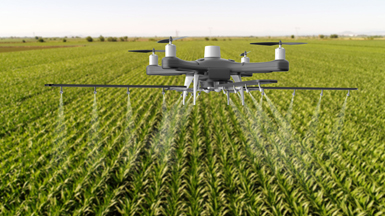
This week, in coordination with industry stakeholders, NAAA issued a letter to Federal Aviation Administration (FAA) Acting Administrator Polly Trottenberg regarding changes to the Part 137 certification process for Uncrewed Aircraft Systems (UAS) operators outlined in FAA Notice 8900.659. This notice was issued June 13 and was summarized in the June 22, 2023 NAAA eNewsletter.
In the letter, NAAA addressed the changes and expressed concern over FAA policy that may impact the safety of its crewed ag aircraft pilots who share this airspace and competitive concerns favoring new UAS businesses entering the aerial application industry over veteran crewed and UAS aircraft businesses.
The notice relaxes the requirement for FAA-administered § 137.19(e) Knowledge and Skills tests, allowing for new UAS applicants to self-administer the test. It also completely relieves the FAA of any required regular surveillance for UAS operators. The FAA justified these changes by deeming UAS operations as “lower risk” than other operations. NAAA pressed for clarity on how this risk assessment was made and to whom the “lower risk” is in reference. Citing specific NTSB accident reports, NAAA asserted that crewed Part 137 operators and pilots are a clear risk bearer of uncrewed Part 137 operations. Further, the unique nature of already busy airspace in agricultural areas during key application windows heightens the need for UAS operators entering this airspace to have rigorous FAA-verified competency to safely operate there.
The notice details a new streamlined process for Part 137 UAS applicants to receive their operating certificate through a central office via email. NAAA expressed concern that this separate centralized approach for UAS may prove to further alienate crewed and uncrewed Part 137 operators, as they would deal with distinctly different FAA officials and oversight, even if treating adjacent fields. NAAA stressed that as airspace becomes concentrated with interacting crewed and uncrewed Part 137 operations, FAA safety coordination becomes more and more important.
There were also distinctly positive changes in the notice, in which NAAA commended the FAA. A minimum of a third-class medical will be required for UAS operators, something NAAA has pushed for across all commercial UAS operations for years. UAS operators will also have a new requirement to generate operations manuals and training programs. Regarding the shift to a UAS central office, it is hoped that the relief FSDOs will get through these changes will subsequently expedite processing for crewed and mixed (crewed/uncrewed) Part 137 applicants.
NAAA will report updates on this matter, including the associated update of Advisory Circular (AC) 137-1, when it is made available.
You can read the letter in its entirety here.